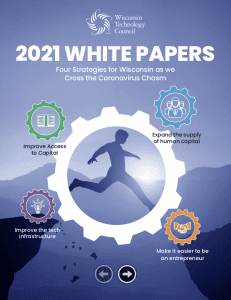Improving access to investment capital for young Wisconsin companies, educating and training a strong workforce, making it easier to be an entrepreneur and building on the state’s tech infrastructure are four major themes of the Wisconsin Technology Council’s 2021 “white papers” report.
 The report is timed for the start of a new session of the Wisconsin Legislature and the start of the 2021-23 state budget debate, which may focus in part on recovery from the COVID-19 pandemic.
The report is timed for the start of a new session of the Wisconsin Legislature and the start of the 2021-23 state budget debate, which may focus in part on recovery from the COVID-19 pandemic.
In addition to ideas in the four focus areas, the report also looks back on goals laid out in 2003 by the Tech Council in one of its earliest publications, “Vision 2020: A Model Wisconsin Economy.”
The Tech Council is the bipartisan, non-profit science and technology policy adviser to the governor and the Legislature, and a catalyst for tech-based development in Wisconsin. The Tech Council periodically issues “white papers” and special reports to assist those policymakers.
“The ideas offered in our 2021 white papers will continue the public discussion about improving the state’s tech-based economy,” said Greg Lynch, chairman of the Tech Council. “As the state weighs its budget priorities for the next two years, policymakers deserve to hear ideas that focus on the creation of next-generation jobs for Wisconsin – and keeping our best and brightest young people at home.”
Here are major recommendations from the 2018 report, “Pathways to Success”:
- Develop talent through means-tested student aid in higher education, much like what is done in Minnesota and other states.
- Enhance tech-based training opportunities for returning and displaced workers.
- Support UW System capital projects that will attract private and public research dollars, as well as the associated talent, while enhancing the economy.
- Invest $25 million over each of the next six years in a fund or funds that can attract private investment dollars to Wisconsin while ensuring the state is treated like other limited partners. This approach would enhance investments in emerging companies, drawing on models developed in other Midwestern states.
- Continue to refine Wisconsin’s successful “Qualified New Business Venture” program, which since 2005 has provided tax credits for angel and venture capital investments in young companies.
- Support fund managers who can offer strong returns on investment while enhancing economic opportunity in Wisconsin’s diverse communities.
- Avoid state-based research restrictions that put Wisconsin at a competitive disadvantage.
- Welcome emerging platforms in broadband and 5G development, which can help reduce the “digital divide” in parts of the state where service gaps were exposed by the pandemic. This can be done by removing regulatory barriers and leveraging existing federal dollars and Wisconsin grants with private support.
- Embrace innovation in energy, transportation and computing capacity.
- Build on Wisconsin’s competitive advantages to attract and retain talent during a time when people and companies may be on the move due to the pandemic and other factors.
Past Tech Council reports have helped produce lasting policy initiatives, such as the Act 255 investor tax credits and the public-private Badger Fund of Funds, which has launched five funds and made two-dozen investments in Wisconsin companies thus far. The report contains a list of 15 such accomplishments over time.
Among other ideas contained in the 2018 papers:
-
- Re-examine professional and occupational licensing.
- Enhance access to out-of-state power.
- Work with the State of Wisconsin Investment Board on early stage investment strategies and contacts.
- Support a federal versus state-based approach to data privacy regulation.
- Support federal bills to create a clear path for a Startup Visa for foreign-born workers and entrepreneurs.
Starting on page 22 of the 32-page report, goals contained in the original “Vision 2020” document are reviewed and compared to the state’s overall performance in the most recent years. Categories include economic output, exports, foreign direct investment, per capita income, early stage capital, high-tech jobs, intellectual property and education levels.
To read past and current white papers and other policy reports, visit wisconsintechnologycouncil.com.





